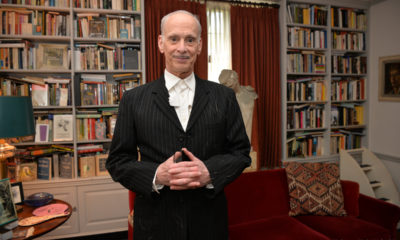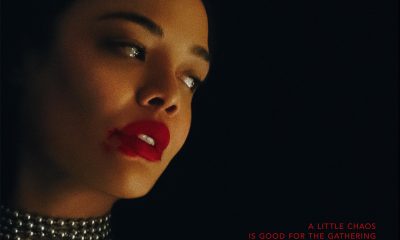a&e features
Actress tells all in ‘Mommie’ memoir
Carol Ann on the shoot from hell and what she’d say to Faye Dunaway today
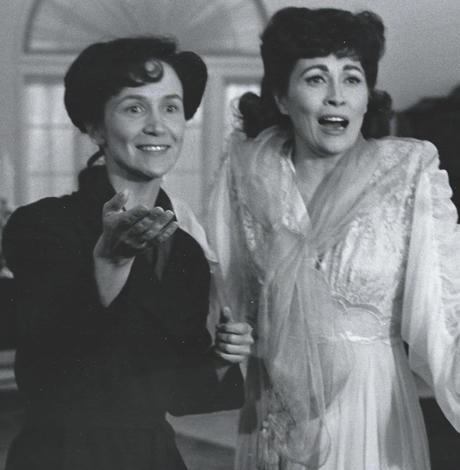
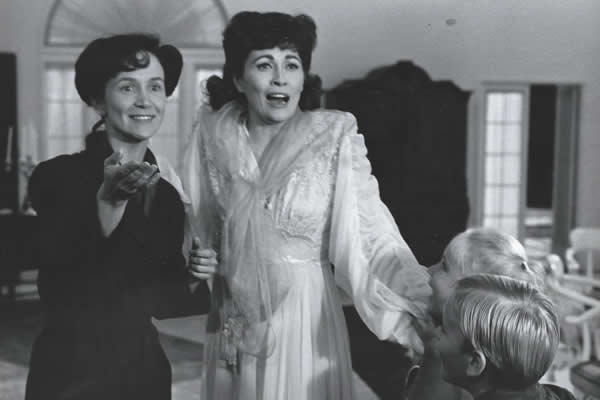
Rutanya Alda, left, with Faye Dunaway, Mara Hobel and Jeremy Scott Reinholt in ‘Mommie Dearest.’ (Photo courtesy Alda)
Editor’s note: this is part two of two of our interview with actress Rutanya Alda, author of”The Mommie Dearest Diary: Carol Ann Tells All.” Part one is here.
WASHINGTON BLADE: Although you don’t hold back at all in your book concerning working with Faye Dunaway, your “Mommie Dearest” co-star, it didn’t feel to me that you had an axe to grind. You write of several moments too where she was gracious — signing photos, posing for photos on set with your brother, when you give her the sweater you made and so on. On the other hand, the book “Mommie Dearest” always felt to me like Christina had a huge axe to grind. Do you agree?
RUTANYA ALDA: I tried to be fair in my book and I hope when Faye reads it she can respect the fact that I was fair to her. … It’s very hard to be with a person on the set who is totally ungiving to the other actor. I just held my tongue then because, as you know from the book, she never stayed for any of my close-ups. I stayed for hers to the 12th, the 13th hour and she never turned around and stayed for any of mine. It’s really not honoring the other actor and we have to honor that. We’re a team working together for the best of the scene. I always felt Faye worked for herself only and that’s the truth. There were private moments when I felt really bad for her … but those moments really didn’t last that long. It’s too bad because, you know honestly, if she had just been gracious (to the crew), they would have embraced her but instead she alienated so many people. When my brother was there as a guest and talked to her, I just got her at a good moment. If it had been a volatile moment, I wouldn’t have dared ask her. The timing just happened to have been right and she was as mellow as she could get. But we were always on pins and needles and you just knew you didn’t want to ask certain things at certain times.
BLADE: Hollywood lore is so full of stories of bitchy star behavior. In your experience, is there always fire where there’s smoke or does some of this get unfairly exaggerated in the public’s endless appetite for such tales?
ALDA: It’s gotten to be so much about me, me, me that some people think the whole world rotates around them and that’s really the worst position for an actor to put themselves in. As Bette Davis said, you’ll meet the same people on your way down as your way up. Fame is fleeting. It lasts for a while. If you have a few years’ run or a decade run, you’re lucky and I think if you can be compassionate and kind, I think that’s a great lesson to give people. I just went to a luncheon at 21 and the coat check girl, so many fairly well known people just throw their coat down and go upstairs and you know, it only takes a second or two to say, “Thank you,” and smile. She remembered me from the time before … just because I treated her like a human being. A lot of stars have come up very quickly and without the experience of being in the industry very long and I think they don’t appreciate the audience as much as they should. A smile or a hello is all you need to give sometimes. Without the audience, you have nothing. …
And the audience of “Mommie Dearest” is a great audience and I think they are disappointed that Faye has never embraced the film. If I were Faye Dunaway, I would have said, “Look, I was great in the part, I did great things. OK, maybe I had an over-the-top performance, but it worked, didn’t it?” But all these years of not talking about it and suddenly after 30 years she’s writing a book? Why? What’s in it for her? Is she doing it for the money? She’s really deprived herself of a great audience of people who love the movie and it’s a detriment to her. Look at all the joy she missed.
BLADE: So you know she is proceeding with her own book?
ALDA: Yes, she has a contract with a publishing house. A friend I know, whom I won’t name unless he names himself, he was just offered to be her ghostwriter. I think she’s gone through several. I e-mailed him and said, “Are you going to do it?” He said, “No, not even if she gives me a million dollars cash would I put myself through this.” So she’s going to find someone from whatever point of view she’s going to do it and I think it’s supposed to be out sometime next year. When she wrote to me, it said time sensitive, she in other words, she probably has a date by which she has to turn it in. Usually it’s a year and a half, then you’re supposed to deliver the book.
BLADE: On his “Mommie Dearest” commentary, John Waters said he thought the film would have worked as straight drama with just some slightly more judicious editing, for instance the scene where you see Diana’s (Scarwid as Christina) panties. Do you agree?
ALDA: (laughs) No. Don’t get me wrong, I love John Waters, I think he’s wonderful, but no, I don’t agree with that. I just ran into an editor who was working on another movie at Paramount at the time and he’d read the script, he’s gay, and he really wanted to edit the film. He loved it and saw it as a camp movie right away and said to Frank, “I want to edit it.” Frank said, “No, you’re the wrong person, we want this to be a big drama,” and I thought, “My gosh, I never knew this.” He said, “You didn’t know it was camp when you read the script?” I said, “No.” He knew right away. But you know, they edited like an hour and a half out of that movie anyway. Some of the takes were really, really long and so much was cut, especially my scenes. I don’t know if it would have changed it but I think it would have made more sense if some of it had been put back, like when my character, Carol Ann, meets Joan and is hired by Joan. I think that would have been a good addition to the story. … But I’m kind of glad the way it turned out because it’s going to continue to have this huge following for years. If it had just been a straight drama, I don’t think we’d be talking today. I think it would have just been one of these movies that was a good movie and then people would have forgotten about it. It’s given people a lot of joy through the years.
BLADE: Do you think “Mommie Dearest” ruined Faye’s career? I know that’s probably an oversimplification, but people say that and it does seem like her filmography is quite spotty after that.
ALDA: I don’t think so. She did quite a few films after it, maybe 10 or 15.
BLADE: Yes, but there was never another “Network” or “Chinatown”-caliber film after it.
ALDA: No, because what did she choose right after “Mommie Dearest”? “Supergirl”? I mean, her choice of material — she still had the power to choose her own material at that point and she was choosing stuff that wasn’t in the same league as “Network,” or, you know, “Chinatown.” I mean these are really great films, really amazing films, and she chooses “Supergirl” and other films you can’t even remember? Even the movie she likes to talk about with Marlon Brando and Johnny Depp (“Don Juan DeMarco”), well that’s not a very good movie. I mean God bless all the actors, but some movies just don’t work. Her choice of parts was really not good. Also I think when one is constantly late on a set and constantly causes production to be slowed down, sooner or later producers just don’t want to lose that money. We went a couple of million dollars over budget because of constant lateness and finally Frank Yablans pulled the plug and we just weren’t going to shoot anymore, that was it. I think today producers won’t put up with that. Show up on time. OK, once in a while, you’re five-10 minutes late, you can’t help it, but not five and six hours late. There’s too much money involved today.
BLADE: “Mommie Dearest” lives on as a camp classic and nobody takes it — at least the film — seriously. Has Joan had the last laugh?
ALDA: Oh, absolutely. Joan Crawford’s career got resurrected. All of a sudden it’s her films that are seen and viewed and she’s kind of the big star here instead of Faye. People are seeing her films. At the Film Forum downtown, there’s a retrospective of her movies next weekend and it’s just amazing. People are rediscovering her that have never seen her movies. I think Joan Crawford has become the big star instead of Faye.
BLADE: Was Joan a good actress?
ALDA: I think she was a wonderful actress for that era. She was over the top and mannered, but that was the movies of that era. I think she was marvelous in those kinds of movies. People don’t act that way today, but they’re fascinating to watch. You look at “Mildred Pierce” and “Baby Jane” and even some of the horror movies she did and she was really pretty impressive. I just saw “Baby Jane” again not long ago and I thought she and Bette were really over the top, but it works. What two actresses today could do that style in that kind of way and make it so memorable and unique? There’s nobody like them.
BLADE: Joan mistook you for Mia Farrow when you were her stand-in on “Rosemary’s Baby” where she was to have had a cameo. Did she say anything after she realized you weren’t Mia?
ALDA: No, she was just very charming. She didn’t come over and say anything afterward but I didn’t go over to her either. She was just standing there, very gracious, and there was something about her that just radiated star. She had been a star for 50 years and she knew who she was.
BLADE: But she didn’t brush you off or anything?
ALDA: No, not at all.
BLADE: You write at length about what a great actor your husband Richard Bright was and it seems like he kind of got swallowed up by the machine, so to speak, with his drug issues. With true persistence and talent, does the cream always rise in Hollywood or have you seen truly talented people fall through the cracks?
ALDA: Unfortunately I don’t think the cream always rises. When I started out 50 years ago, I knew a lot of really, really talented people, much more talented than the people that eventually became stars, I thought, so no. But it’s very difficult because a lot of really talented people are also so sensitive and their sensitivity winds up destroying them. In Richard’s case, he was a wonderful actor, really terrific, as Al Pacino acknowledges. He used to watch Richard work. (Richard was) pained by not working and that’s what really drove him to drugs — the pain from not working and expressing himself. I think so much of it is just luck. I’ve known a lot of people who do it for 10-15 years and they just emotionally can’t take it anymore, the rejection. It’s just such a crapshoot and you don’t know what direction your life takes you. … Look at someone like Phillip Seymour Hoffman. … As painful as that was, I think that opened a little more compassion in people because he was one who did achieve a lot of success. … It’s a very, very difficult business. People shove their kids in front of me and ask for advice for this teenage girl who wants to be an actress. I always say don’t do it if you have any other choice of a career. It’s gotta be in your blood so deep that you can’t do anything else. … Enjoy your life. Life is short. Being an actor is like having a virus you can’t get rid of.
BLADE: Do you wish you had left Richard sooner?
ALDA: Well I loved my husband a lot. … He was a good person, a very generous person. I just had no idea what his addiction meant and that it was so hard to break that chain. I didn’t understand that you can’t do it for them. …. This was the ‘80s and there was a lot then we didn’t fully understand. I think later when the Betty Fords and other programs, there was more understanding, but this was the early ‘80s.
BLADE: Do you think Christina wrote her book just to get back at Joan for being left out of the will?
ALDA: No, because I think the book was already more or less written before Joan died. Now, did Joan leave her out of the will because she knew she was writing a book? I don’t know, maybe. But the book was done before the will. Had it been the other way around, I might have said yeah. It was a scandalous thing to do at the time because she was the first to do it, the first to write and sort of reveal her life with a major star. Later one of the Crosby kids wrote about Bing Crosby and Bette Davis’s daughter wrote about Bette Davis, but she was the first.
BLADE: Had you read the book when it came out or did you read it when you got the part?
ALDA: I read it when I was getting ready for the film, I’d heard about but didn’t read it until I was cast.
BLADE: Why did Christina never visit the set? I would have thought she’d have been at least curious.
ALDA: She told me the script was totally different and she just wanted to let it go. She and her husband, David Koontz, had written a script that was rejected so after Frank and Frank took over, she just felt she’d sold the rights, it was going to be what it was going to be and it was out of her hands so she had not interest in visiting the set.
BLADE: Why did you choose the self-publishing route for your book?
ALDA: I’d had it with an agent for almost two years and I just felt he wasn’t getting it out to the right people. I could have tried to find another agent but I thought, OK, that could be another two years. I learned things happen rather slowly in the publishing world, at least from my experience, and I felt this was the right time to put it out. Actually Christina Crawford was one person who encouraged me to self publish because she had done it after “Mommie Dearest.” … I thought, well, at least that way we’ll get it out into the world and I won’t be waiting and waiting and waiting. I’m glad I did it because at least I beat Faye.
BLADE: You write of how painful the makeup was on the film. How long did it take your face to fully heal after the film?
ALDA: About a month. Things are better with appliances now, but at the time with all that glue on your skin, it was really sore and red and tender.
BLADE: You said you knew of the film’s camp element immediately upon seeing it, but did you realize the gay element in that then too or did that come later?
ALDA: I didn’t really know that then, no. I think my first inkling to that was when I did the Town Hall show Mother’s Day with Joan about 10 years ago with Lypsinka, who is absolutely brilliant. Then, of course, about three years ago there was a show with Hedda Lettuce. She said, “Do you have any stories from ‘Mommie Dearest,’” and I said, “Yeah, I kept a journal.” She said, “Could you come read something from it,” so I went and read a few things. Then Marc Huestis called me two years ago and asked me to come to the Castro to read from it. I said, “Do you think anybody would be interested?” He said yes, so then at the Castor there were like 1,500 beautiful gay men and honestly just this wave of love that hit me and, wow, I still feel it in my heart, this love and support that came from the audience. I’m very emotional about it still. I read from my diary and they just went wild, they were so wonderful. So they were the first real audience and I thought, oh my God, I’ve got to publish this book. It hit me that people were really interested.
BLADE: Did you read Faye’s autobiography “Looking for Gatsby”?
ALDA: No. I went to Barnes & Noble to look at it. I thumbed through it but there didn’t seem to be much on “Mommie Dearest” so I didn’t buy it.
BLADE: What would you say if you were in an elevator with her?
ALDA: Hi. But she might not answer me because there were a lot of times on the set when she’d just walk right by. I’d be prepared for that.
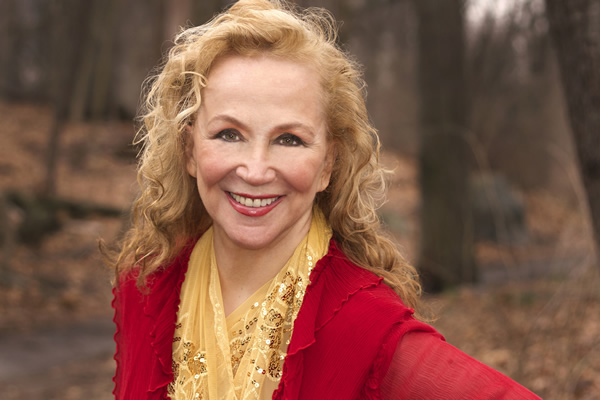
Rutanya Alda today. (Photo courtesy Alda)
a&e features
Queer highlights of the 2026 Critics Choice Awards: Aunt Gladys, that ‘Heated Rivalry’ shoutout and more
Amy Madigan’s win in the supporting actress category puts her in serious contention to win the Oscar for ‘Weapons’
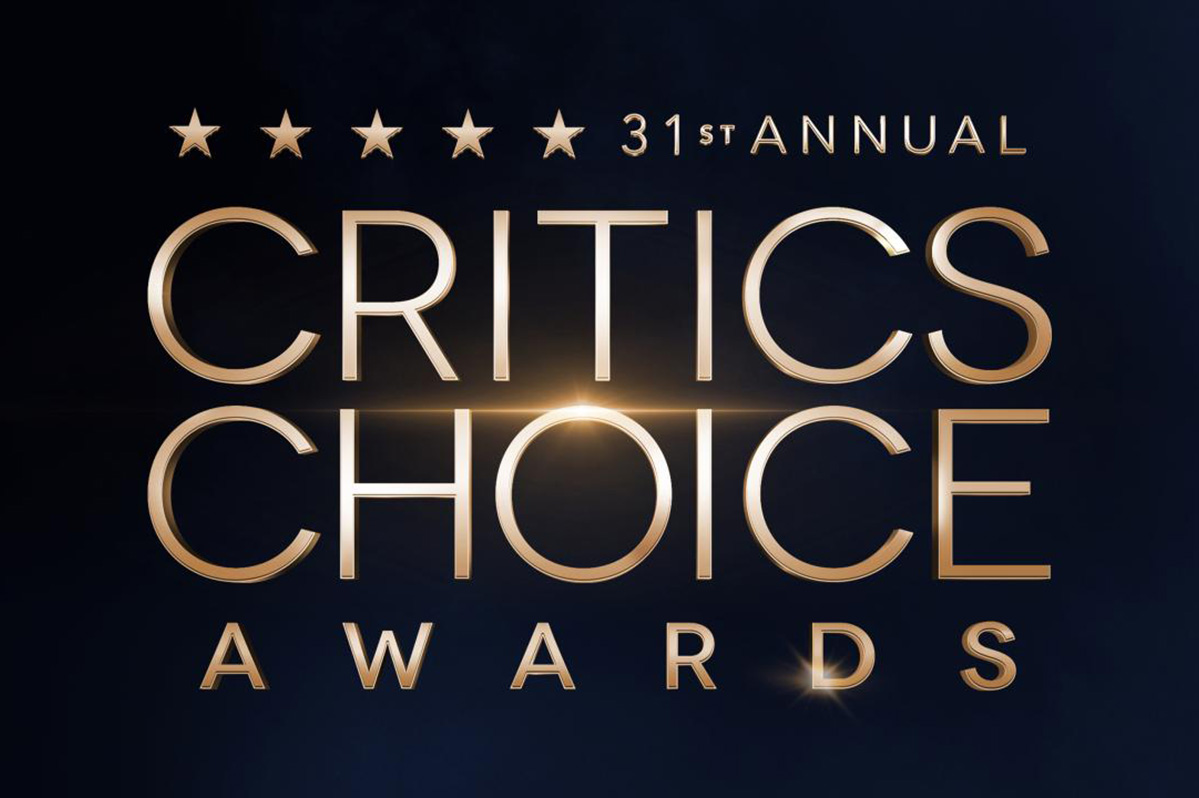
From Chelsea Handler shouting out Heated Rivalry in her opening monologue to Amy Madigan proving that horror performances can (and should) be taken seriously, the Critics Choice Awards provided plenty of iconic moments for queer movie fans to celebrate on the long road to Oscar night.
Handler kicked off the ceremony by recapping the biggest moments in pop culture last year, from Wicked: For Good to Sinners. She also made room to joke about the surprise hit TV sensation on everyone’s minds: “Shoutout to Heated Rivalry. Everyone loves it! Gay men love it, women love it, straight men who say they aren’t gay but work out at Equinox love it!”
The back-to-back wins for Jacob Elordi in Frankenstein and Amy Madigan in Weapons are notable, given the horror bias that awards voters typically have. Aunt Gladys instantly became a pop culture phenomenon within the LGBTQ+ community when Zach Cregger’s hit horror comedy released in August, but the thought that Madigan could be a serious awards contender for such a fun, out-there performance seemed improbable to most months ago. Now, considering the sheer amount of critics’ attention she’s received over the past month, there’s no denying she’s in the running for the Oscar.
“I really wasn’t expecting all of this because I thought people would like the movie, and I thought people would dig Gladys, but you love Gladys! I mean, it’s crazy,” Madigan said during her acceptance speech. “I get [sent] makeup tutorials and paintings. I even got one weird thing about how she’s a sex icon also, which I didn’t go too deep into that one.”
Over on the TV side, Rhea Seehorn won in the incredibly competitive best actress in a drama series category for her acclaimed performance as Carol in Pluribus, beating out the likes of Emmy winner Britt Lower for Severance, Carrie Coon for The White Lotus, and Bella Ramsey for The Last of Us. Pluribus, which was created by Breaking Bad’s showrunner Vince Gilligan, has been celebrated by audiences for its rich exploration of queer trauma and conversion therapy.
Jean Smart was Hack’s only win of the night, as Hannah Einbinder couldn’t repeat her Emmy victory in the supporting actress in a comedy series category against Janelle James, who nabbed a trophy for Abbott Elementary. Hacks lost the best comedy series award to The Studio, as it did at the Emmys in September. And in the limited series category, Erin Doherty repeated her Emmy success in supporting actress, joining in yet another Adolescence awards sweep.
As Oscar fans speculate on what these Critics Choice wins mean for future ceremonies, we have next week’s Golden Globes ceremony to look forward to on Jan. 11.
a&e features
Looking back at the 10 biggest A&E stories of 2025
‘Wicked,’ Lady Gaga’s new era, ‘Sexy’ Bailey and more
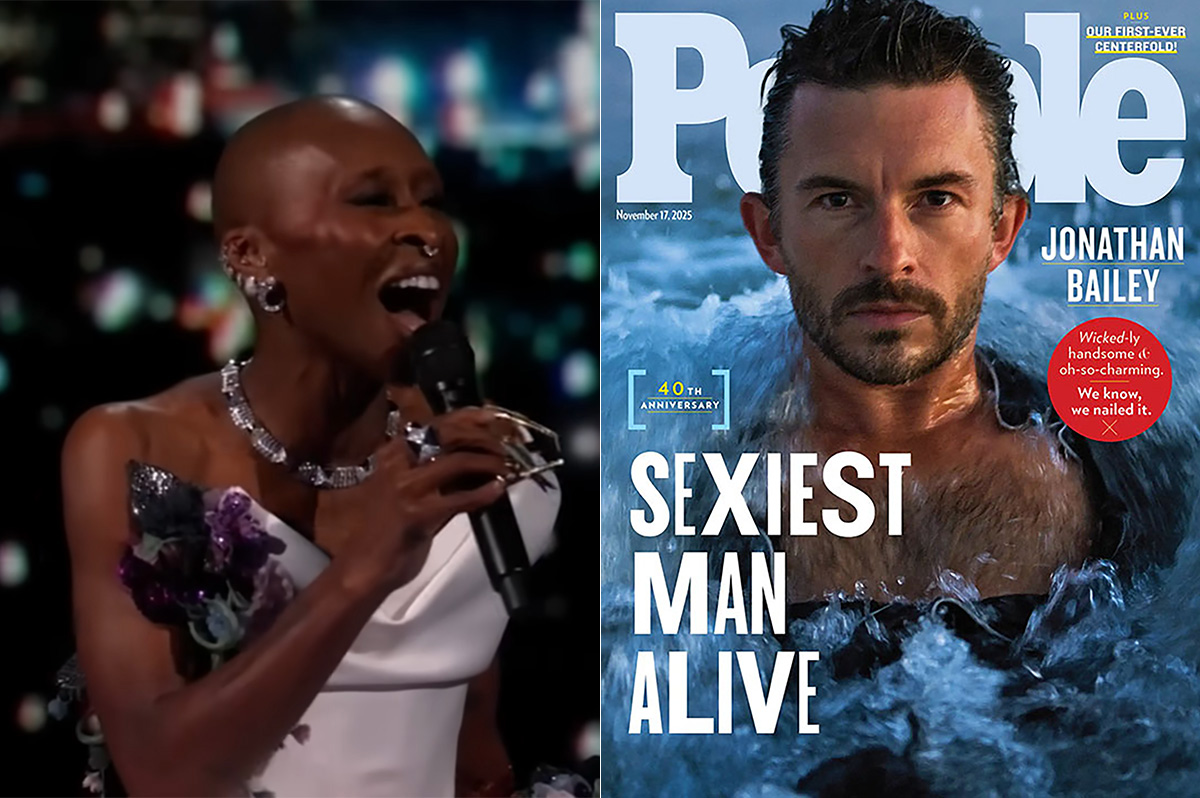
Although 2025 was a year marked by countless attacks on trans rights and political setbacks, the year also saw brilliant queer artists continuing to create art. From Cannes and Sundance Award winners now vying for Oscar consideration to pop icons entering new stages of their careers, queer people persevered to tell their stories through different media.
With the state of the world so uncertain, perhaps there’s no more vital time to celebrate our wins, as seen through some of this year’s top pop culture moments. While there’s no collection of 10 stories that fully encompass “the most important” news, here are some events that got the gays going:
10. ‘Mysterious Gaze of the Flamingo’ wins big at Cannes
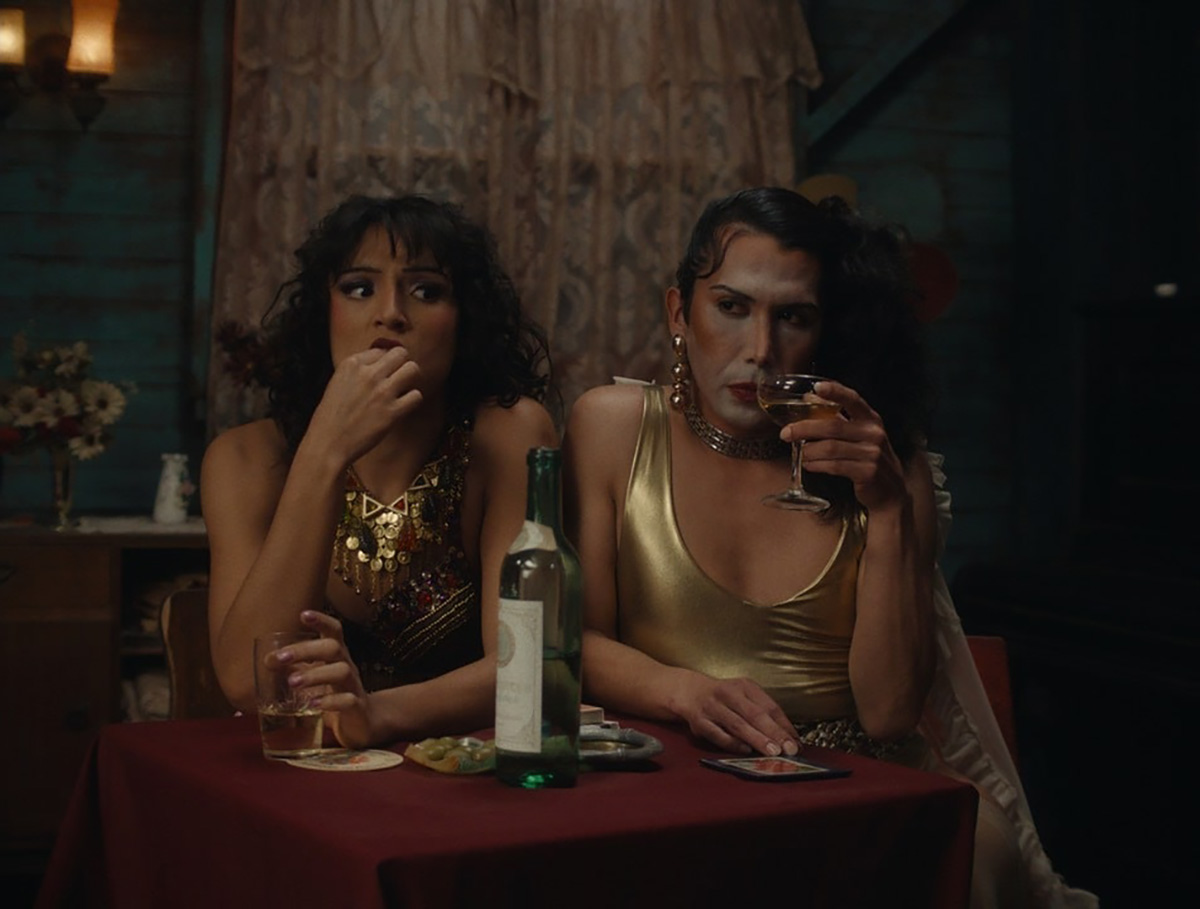
The Cannes Film Festival has become a crucial start for films hoping to make their way to the Oscars, and first-time director Diego Céspedes won the top Un Certain Regard prize for his intimate western “The Mysterious Gaze of the Flamingo.” The film is set in the ‘80s and is intended as an allegory for the AIDS epidemic. Seeing a film that unpacks vital queer history win one of the most coveted awards at Cannes has been a huge point of pride in the independent filmmaking community.
Since the film bowed at Cannes, it has been selected as Chile’s Oscar entry in the Best International Feature race. Speaking with The Blade during the film’s AFI Fest run in October, Céspedes said: At first, I was kind of scared to have this campaign position in the times that we’re living [in] here. But at the same time, I think the Oscars mean a huge platform — a huge platform for art and politics.”
9. ‘The Last of Us’ returns for an even gayer season 2
While the first season of The Last of Us gave us one of TV’s most heartbreaking queer love stories in the episode “Long, Long Time,” Season 2 doubled down on its commitment to queer storytelling with the blossoming relationship between Ellie (Bella Ramsey) and Dina (Isabela Merced). The show expanded on the pair’s relationship in the original video game, making it perhaps the central dynamic to the entire season. That unfortunately came with more homophobic backlash on the internet, but those who checked out all the episodes saw a tender relationship form amid the show’s post-apocalyptic, often violent backdrop. For their performance, Ramsey was once again nominated for an Emmy, but Merced deserved just as much awards attention.
8. ‘Emilia Pérez’ sparks controversy
Jacques Audiard’s genre-bending trans musical “Emilia Pérez” proved to be an awards season juggernaut this time last year, winning the Golden Globe for Best Musical/Comedy. But when the lead star Karla Sofia Gascón’s racist, sexist, and homophobic old tweets resurfaced, the film’s Oscar campaign became a tough sell, especially after Netflix had tried so hard to sell Emilia Pérez as the “progressive” film to vote for. Mind you, the film had already received significant backlash from LGBTQ+ audiences and the Mexican community for its stereotypical and reductive portrayals, but the Gascón controversy made what was originally just social media backlash impossible to ignore. The only person who seemed to come out of the whole debacle unscathed was Zoe Saldaña, who won the Oscar for Best Supporting Actress over Ariana Grande.
7. ‘Sorry, Baby’ establishes Eva Victor as major talent
Back in January at the Sundance Film Festival, Eva Victor (known by many for her brand of sketch comedy) premiered their directorial debut “Sorry, Baby” to rave reviews, even winning the Waldo Salt Screening Award. Victor shadowed Jane Schoenbrun on the set of “I Saw the TV Glow,” and seeing Victor come into their own and establish such a strong voice immediately made them one of independent cinema’s most exciting new voices. A memorable scene in the film sees the main character, Agnes (played by Victor), struggling to check a box for male or female, just one example of how naturally queerness is woven into the fabric of the story.
Most recently, Victor was nominated for a Golden Globe for her performance in the film, and she’s represented in a category alongside Jennifer Lawrence (“Die My Love”), Jessie Buckley (“Hamnet”), Julia Roberts (“After the Hunt”), Renate Reinsve (“Sentimental Value”) and Tessa Thompson (“Hedda”). The film also received four Independent Spirit Award nominations overall.
6. Paul Reubens comes out in posthumous doc
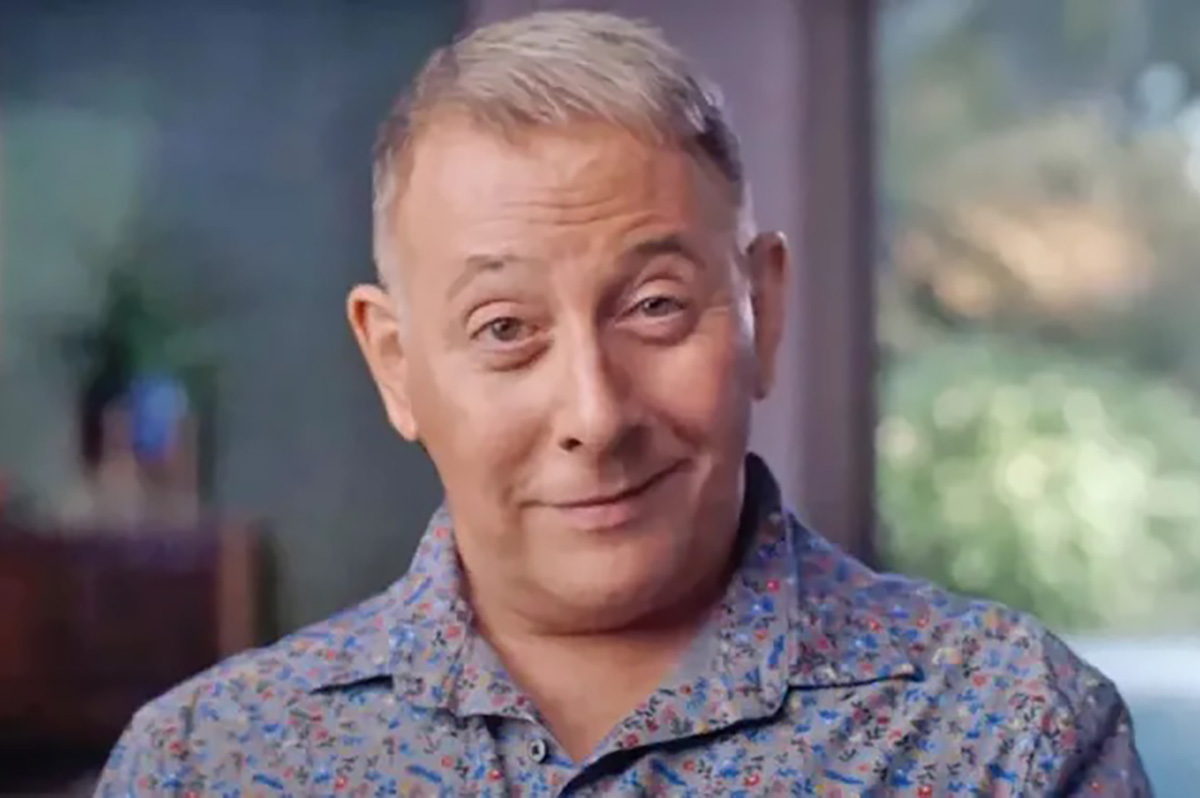
While Paul Reubens never publicly came out as gay before passing away in 2023, the two-part documentary “Pee-wee as Himself” premiered back in May on HBO Max, giving the legendary comedian a chance to posthumously open up to the world. Directed by Matt Wolf, the documentary explores how Reubens found his alter ego Pee-Wee Herman and why he kept his private life private.
The documentary won an Emmy in the Outstanding Documentary or Nonfiction Special category and remains one of the most critically acclaimed titles of the year with a 100% Rotten Tomatoes score. Also worth noting, the National Geographic documentary Sally told the posthumous coming out story of Sally Ride through the help of her long-time partner, Tam O’Shaughnessy.
5. Lady Gaga releases ‘Mayhem’
Lady Gaga entered a new phase of her musical career with the release of Mayhem, her seventh album to date. From the frenzy-inducing pop hit Abracadabra to the memorable Bruno Mars duet featured on “Die With a Smile,” seeing Gaga return to her roots and make an album for the most die-hard of fans was especially rewarding after the underwhelming film releases of “House of Gucci” and “Joker: Folie à Deux.” Gaga has been touring with The Mayhem Ball since July, her first arena tour since 2018. She even extended her tour into 2026 with more North American dates, so the party isn’t stopping anytime soon. And Gaga is even set to make an appearance next May in “The Devil Wears Prada 2.”
4. Cynthia Erivo, Ariana Grande perform at the Oscars
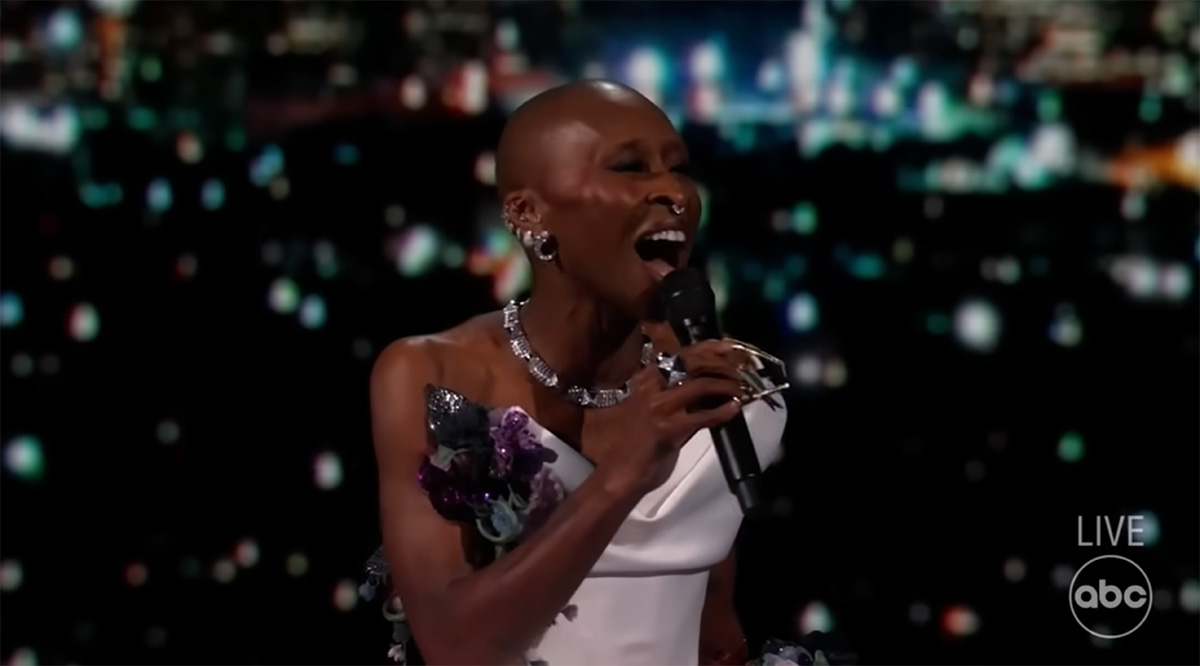
While “Wicked: For Good” didn’t quite reach the heights of the first film, we will forever have Cynthia Erivo and Ariana Grande’s breathtaking live performance that opened the 97th Academy Awards. The pair sang a rendition of “Over the Rainbow,” “Home,” and “Defying Gravity,” paying proper homage to the original 1939 “Wizard of Oz.” Even non-Wicked fans can’t deny how magical and brilliantly staged this performance was. With both Erivo and Grande up for acting Oscars last year, they’re hoping to repeat success and make history with consecutive nominations. Either way, let’s hope there’s another live performance in the making, especially with two new original songs (The Girl in the Bubble and No Place Like Home) in the mix.
3. Indya Moore speaks out against Ryan Murphy
Indya Moore has consistently used social media as a platform for activism, and in September, posted a 30-minute Instagram live speaking out against “Pose” co-creator Ryan Murphy. Moore claimed that Murphy wasn’t being a true activist for trans people. “Ryan Murphy, we need you to do more. You need to address the racism, the violence, and the targeting of people on your productions, Ryan Murphy. You do need to make sure trans people are paid equally. Yes, Janet did the right thing,” Moore said. Murphy was also back in the headlines this year for the critically panned “All’s Fair” and the controversial “Monster: The Ed Gein Story” starring Laurie Metcalf and Charlie Hunnam.
2. Cole Escola wins Tony for Best Leading Actor
Few pop culture moments this year brought us together more than Cole Escola winning a Tony award for “Oh, Mary!” the Broadway show they created, wrote and starred in (we love a triple threat!) Escola made history by becoming the first nonbinary person to win a Tony in the leading actor category, and seeing them excitedly rush to the stage wearing a Bernadette Peters-inspired gown instantly became a viral social media moment.
The cherry on top of Escola’s major moment is the recent news that they are writing a Miss Piggy movie with Jennifer Lawrence and Emma Stone producing — news that also broke the internet for the better. We cannot wait!
1. Jonathan Bailey makes gay history as ‘Sexiest Man Alive’
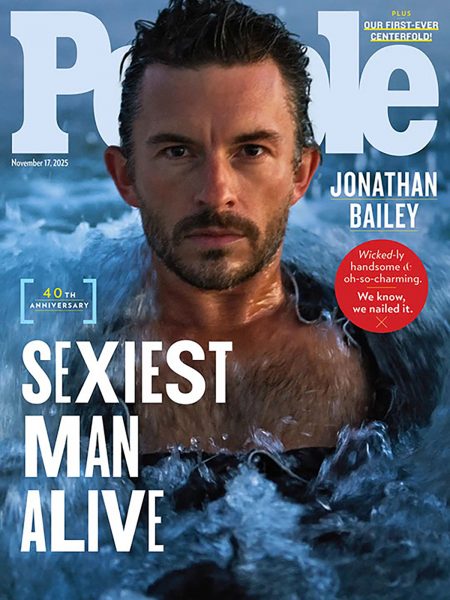
The same year as his on-screen roles in blockbusters “Jurassic World Rebirth” and “Wicked: For Good,” Jonathan Bailey made history as the first openly gay man to be named People magazine’s “Sexiest Man Alive.” The fact that it took 40 years for an openly gay man to earn the title is a signifier of how far we still have to go with queer representation, and seeing Bailey celebrated is just one small step in the right direction.
“There’s so many people that want to do brilliant stuff who feel like they can’t,” he told PEOPLE, “and I know the LGBT sector is under immense threat at the moment. So it’s been amazing to meet people who have the expertise and see potential that I could have only dreamed of.” In 2024, Bailey founded the charity titled The Shameless Fund, which raises money for LGBTQ+ organizations.
a&e features
Your guide to D.C.’s queer New Year’s Eve parties
Ring in 2026 with drag, leather, Champagne, and more
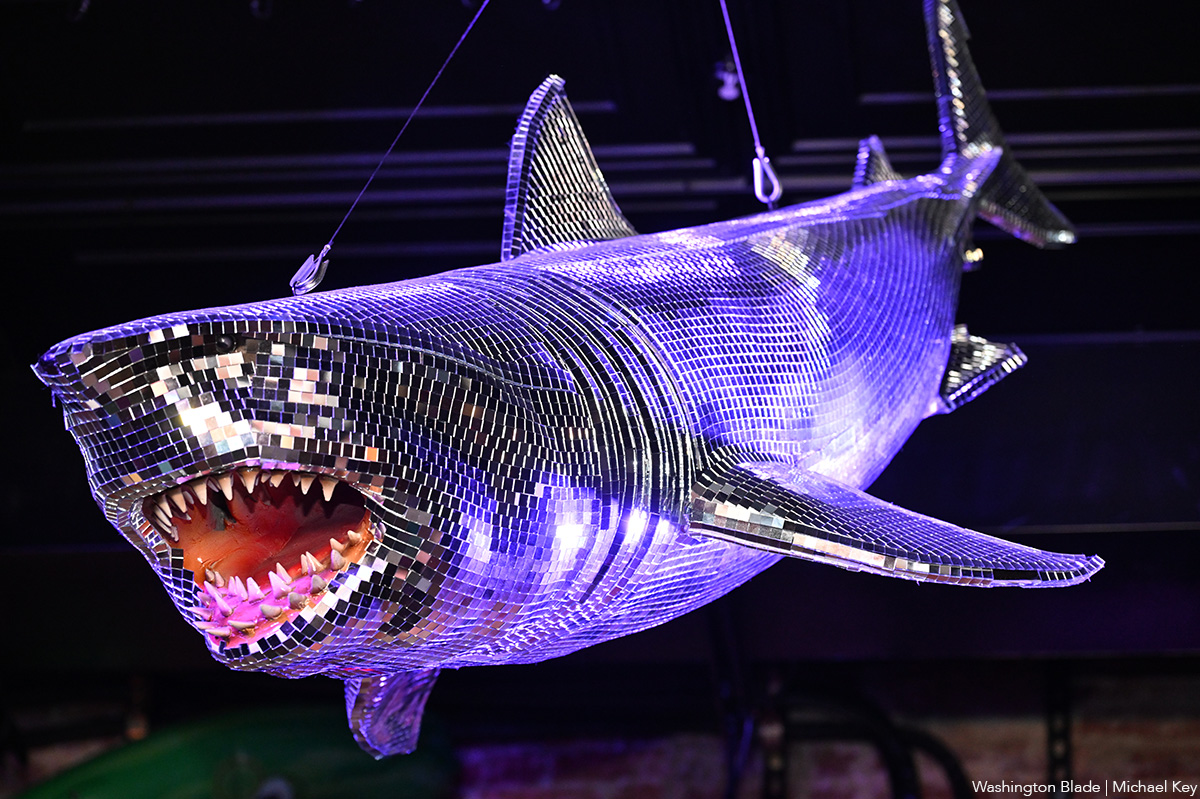
With Christmas in the rear view mirror, we can turn our attention to ringing in a much-anticipated New Year with a slew of local LGBTQ parties. Here’s what’s on tap.
Pitchers
This spacious Adams Morgan bar is hosting the “Pitchers’ Perfect New Year’s Eve.” There will be a midnight Champagne toast, the ball drop on the big screens, and no cover, all night long. The bar doesn’t close until 4 a.m., and the kitchen will be open late (though not until close). All five floors will be open for the party, and party favors are promised.
Trade
D.C.’s hottest bar/club combo is leaning into the Shark motif with its NYE party, “Feeding Frenzy.” The party is a “glitterati-infused Naughty-cal New Year’s Even in the Shark Tank, where the boats are churning and the sharks are circling.” Trade also boasts no cover charge, with doors opening at 5 p.m. and the aforementioned Shark Tank opening at 9 p.m.. Four DJs will be spread across the two spaces; midnight hostess is played by Vagenesis and the two sea sirens sensuously calling are Anathema and Justin Williams.
Number Nine
While Trade will have two DJs as part of one party, Number Nine will host two separate parties, one on each floor. The first floor is classic Number Nine, a more casual-style event with the countdown on TVs and a Champagne midnight toast. There will be no cover and doors open at 5 p.m. Upstairs will be hosted by Capital Sapphics for its second annual NYE gathering. Tickets (about $50) include a midnight Champagne toast, curated drink menu, sapphic DJ set by Rijak, and tarot readings by Yooji.
Crush
Crush will kick off NYE with a free drag bingo at 8 p.m. for the early birds. Post-bingo, there will be a cover for the rest of the evening, featuring two DJs. The cover ($20 limited pre-sale that includes line skip until 11 p.m.; $25 at the door after 9 p.m.) includes one free N/A or Crush, a Champagne toast, and party favors (“the legal kind”). More details on Eventbrite.
Bunker
This subterranean lair is hosting a NYE party entitled “Frosted & Fur: Aspen After Dark New Year’s Eve Celebration.” Arriety from Rupaul Season 15 is set to host, with International DJ Alex Lo. Doors open at 9 p.m. and close at 3 p.m.; there is a midnight Champagne toast. Cover is $25, plus an optional $99 all-you-can-drink package.
District Eagle
This leather-focused bar is hosting “Bulge” for its NYE party. Each District Eagle floor will have its own music and vibe. Doors run from 7 p.m.-3 a.m. and cover is $15. There will be a Champagne toast at midnight, as well as drink specials during the event.
Kiki, Shakiki
Kiki and its new sister bar program Shakiki (in the old Shakers space) will have the same type of party on New Year’s Eve. Both bars open their doors at 5 p.m. and stay open until closing time. Both will offer a Champagne toast at midnight. At Kiki, DJ Vodkatrina will play; at Shakiki, it’ll be DJ Alex Love. Kiki keeps the party going on New Year’s Day, opening at 2 p.m., to celebrate Kiki’s fourth anniversary. There will be a drag show at 6 p.m. and an early 2000s dance party 4-8 p.m.
Spark
This bar and its new menu of alcoholic and twin N/A drinks will host a NYE party with music by DJ Emerald Fox. Given this menu, there will be a complimentary toast at midnight, guests can choose either sparkling wine with or without alcohol. No cover, but Spark is also offering optional wristbands at the door for $35 open bar 11 p.m.-1 a.m. (mid-shelf liquor & all NA drinks).

